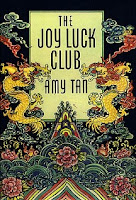Ø WASP 美國夢喜福會
Ø The Joy Luck Club
A best-selling novel
written
by Amy Tan. It focuses on four Chinese American immigrant families in San
Francisco who start a club known as The Joy Luck Club, playing the Chinese game of mahjong for money while
feasting on a variety of foods. The book is structured somewhat like a mahjong game, with four parts divided into four sections to create sixteen
chapters. The three mothers and four daughters (one mother, Suyuan Woo,
dies before the novel opens) share stories about their lives in the form of
vignettes. Each part is preceded by a parable relating to the game.
Ø Life of systems of human
body
The human body is the entire structure of a human being and
comprises a head, neck, trunk (which includes the
thorax and abdomen), arms
and hands, legs and feet. Every part of the
body is composed of various types of cells, the fundamental unit of life.
The
study of the human body involves anatomy and physiology.
The human body can show anatomical non-pathological anomalies known as
variations which need to be able to be recognised. Physiology
focuses on the systems
and their organs of the human body and their functions. Many systems
and mechanisms interact in order to maintain homeostasis.
Ø SARS (sever acute
respiratory syndrome)
Severe acute respiratory
syndrome (SARS)
is a viral respiratory
disease of zoonotic origin caused by the SARS coronavirus (SARS-CoV).
Signs and symptoms
Initial
symptoms are flu-like
and may include fever, myalgia, lethargy symptoms, cough, sore throat, and other
nonspecific symptoms. The only symptom common to all patients appears to be a fever above 38 °C (100 °F).
SARS may eventually lead to shortness of breath and/or pneumonia; either direct
viral pneumonia or secondary bacterial pneumonia.
Ø Airy nothing a local
habitation and a name ( A MIDSUMMER NIGHT’S DREAM) (Act 5, Scene 1)
The
forms of things unknown, the poet’s pen
Turns
them to shapes and gives to airy nothing
A
local habitation and a name. (
Such
tricks hath strong imagination,
That
if it would but apprehend some joy,
It
comprehends some bringer of that joy.
Or
in the night, imagining some fear,
How
easy is a bush supposed a bear!
Ø To kill a Mockingbird
Ø The Grasshopper and the
Cricket Summary
Yasunari Kawabata
Summary
Walking
along the wall of a university, the narrator hears an insect’s voice from behind the fence of a school
playground. The fence gives way to an embankment, at the base of which
the narrator sees a cluster of bobbing, multicolored lanterns.
The
narrator now imagines that one of the neighborhood children, having heard an
insect sing on the slope one night, returns the next night to search for the
insect. The next night, another
child joins the first one, and so on. When the narrator comes on the insect hunting party, he
counts twenty children among its members.
The
narrator imagines a scenario in which one child, unable to afford a
store-bought red lantern, creates his own from a small carton. Others follow
his example. The narrator
pictures the children coloring and drawing on paper they then stretch over the
various-shaped windows they have cut out of the cartons, each making a singular pattern.
Eventually, the child who
bought his lantern grows dissatisfied with it and discards it. The
narrator supposes that each day the children—whom the narrator likens to
artists—create new lanterns. Brought back to the present, the narrator notices on the
lanterns the names of the children who made them, cut in letters of the
syllabary.
A
boy who has been peering into a bush away from the other children suddenly asks
if anyone wants a grasshopper. A number of children gather around; he calls again, and
more children flock to him.
(川端 康成
11 June 1899 – 16 April 1972) was a Japanese novelist and short story writer whose
spare, lyrical, subtly-shaded prose works won him the Nobel Prize for Literature in 1968, the first Japanese author to receive the award. His works
have enjoyed broad international appeal and are still widely read.
Ø Vocabulary
Ø Ann-; enn-
= year
l Anniversary: a date
when you celebrate something that happened in a previous year that is important to
you
l Annual: happening once a year
Annual
fee, annual meeting
Ø Gene- (gen-): something produced
l Genesis: the beginning, birth, or origin of something
l Generation:
a group
of people in society who are born
and live around the same time
l Genus:
a group
that includes all living things that have similar features. It usually has a
Latin name.






沒有留言 :
張貼留言